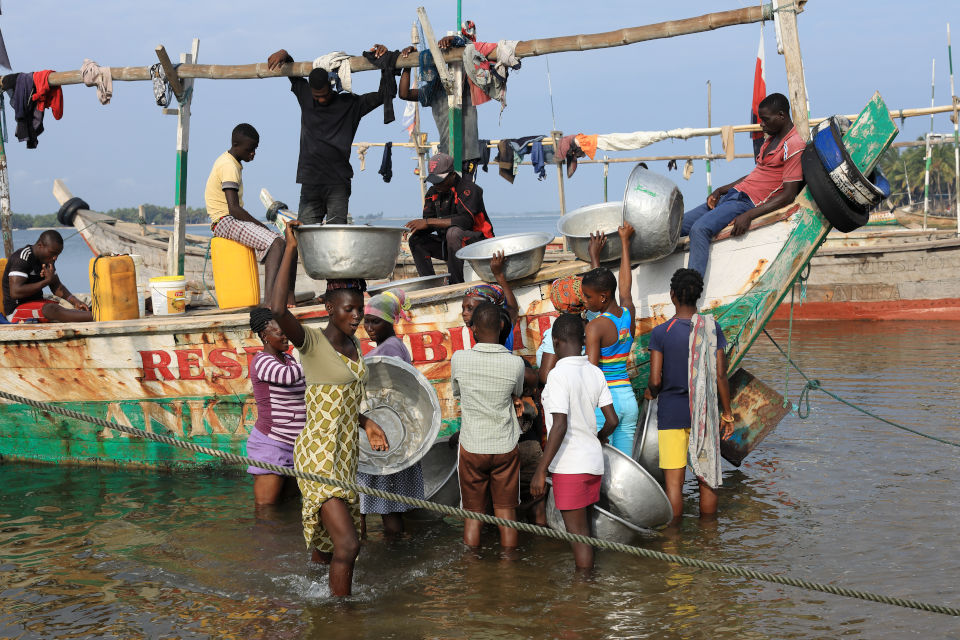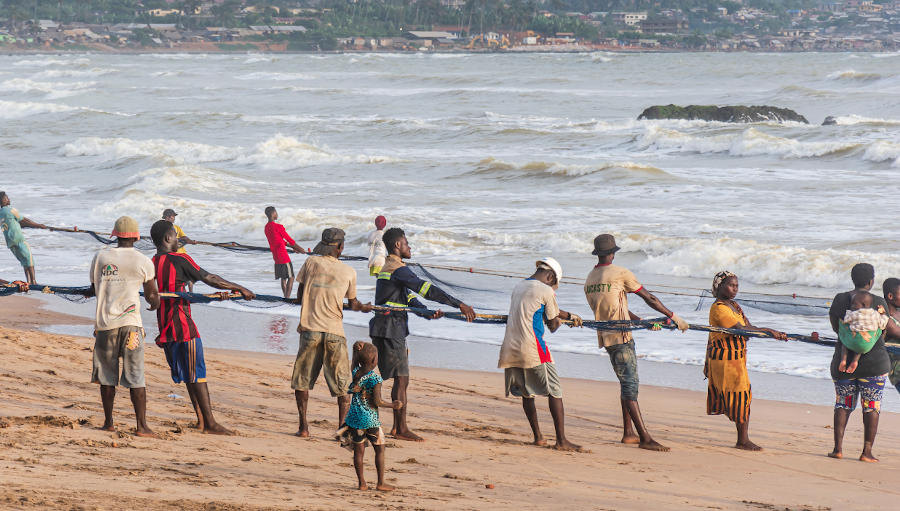By now it is evident that the pandemic will continue to disrupt our professional and personal lives till the foreseeable future. Nevertheless, the Ghana team has not despaired and came up with innovative methods to continue working.
On the RP 1 front, the team in Ghana is currently focusing on two key areas. The first is the work on customary laws of ocean communities. This research will explore the customs, traditions, and laws of select ocean-facing communities in Ghana within the context of the extant legal framework. The second research area focuses on human rights approaches within the emerging blue economy. The team is exploring how, in the context of emerging pressures on livelihoods, a human rights approach can be useful for fishing communities.
“I am currently learning about new approaches to research and new methods from the anthropologists and other social scientists on the team. It will also present an opportunity to obtain rich data which should inform much of our work for the coming two years”, Bola Erinosho says.
“We’ve rescheduled in-person activities and are looking into options for using alternative research methods from online research to photography or film, that could be produced by research participants if they were willing and maintaining social distancing. Those plans are still evolving, and we return to them in the autumn”, Laura Major says.
Before lockdown, the Ghana team received a Flexible Fund support to hold a workshop at the University of Cape Coast. This will focus on customary laws pertaining to sea waters and coastal areas and will be a collaborative effort by colleagues across different RPs and institutions. The workshop, as David Wilson notes, has been postponed due to the global health crisis, giving the team more time for planning.
“We are particularly excited to begin working with Hen Mpoano (a community based civil society organisation) on this, discussing how we can best engage community members and representatives within this space”, Wilson says.
“The organisation will be instrumental in facilitating community access, particularly in the western region”, Erinosho adds.
Laura Major and Bola Erinosho, are doing research for a co-authored publication that focuses on law, politics, and sustainable fisheries management. The concept note for this will be circulated to the RP1 group in September.
Laura Major and three research assistants will also carry out empirical research within fisheries on the Ghanaian coast. The research will use Rapid Research and Evaluation Techniques to conduct a series of ethnographic studies with findings contributing to the Hub’s legal research and advocacy activities. The research aims to generate rich ethnographic data on these areas, providing early career researchers based in Ghana to refine their research skills and contribute to the development of potentially broader projects.
David Wilson is currently focusing on a literature review of the pre-colonial and colonial history of Ghana (c. 1600-1957), focusing on the maritime perspectives that underpin much of this work. This review will culminate in an article tentatively titled “Maritime Histories of Ghana: Insights from the historiographies of coastal communities, seafaring, and marine power in pre-colonial and colonial Ghana, 1600-1957” (c. December 2020). The article will highlight the key insights of current studies and outline the benefits of meaningfully engaging with ocean-facing perspectives to better explore the history of Ghana during the eras of the slave trade, ‘legitimate commerce’, and formal colonisation.
“I have also had some recent conversations with Dr Philile Mbatha and Professor Rose Boswell about the history of Indigenous Peoples and ocean governance in South Africa in which we’ve discussed the potential benefits of using a comparative lens to explore maritime heritage across Ghana and South Africa, particularly due to the different experiences and legacies of colonialism in both regions, and the impact this has had on ocean governance. I’m looking forward to working towards formalising some form of collaborative comparative examination along these lines, working with colleagues across UCC, NMU, UCT and Strathclyde”, Wilson says.

The Customary Law Research Network
The Ghana team is excited about The Customary Law Research Network, an internal Hub network incorporating researchers working on aspects of law and custom from across the Hub´s regions. There is a number of online panels planned for the next few months:
A panel looking at oceans´ management projects from locations other than the Hub´ regions, which have successfully engaged with local traditions and customary laws;
A panel focusing on the planned legal work in Ghana;
And, finally, a panel titled “Necropolitics and the ocean”
“We have also been running these panel sessions in collaboration with the UN Nippon Fellows programme and David Wilson is leading a panel in September which will be a general introduction to customary law”, Major says.
It will be open to all, and will include perspectives on customary law in Ghana, as well as in the Caribbean, South Africa, and Solomon Islands. There will also be a specific digital event focused on Ghana before our in-person workshop at UCC.
A common resource: a Geometadatabase
The Ghana RP3 team in consultation with the Ghana Environmental Protection Agency (EPA) has been implementing the development of a geometadatabase. The team has also secured the support of the Fisheries Commission of Ghana.
The integrated and sustainable management of fisheries in Ghana is dependent on the availability of tools and models which can be used to inform evidence-based decision making. This is a key goal of the One Ocean Hub in Ghana. The geometadatabase can serve as a common resource for data on fisheries and supporting ecosystems in Ghana. This resource aims to make data accessible to shape inform the management of fisheries in Ghana and support capacity for further research.
A key challenge is an access to historical data from previous development projects in the region. This is a trend in specific research on data accessibility which the Hub aims to explore in greater depth. Colleagues from CEFAS, Plymouth and the University of Cape Coast have been working to access this historical data.
Access to the Hub’s metageodatabase will also enable the development of several other tools to support the integrated management of marine resources. In particular, the team are developing an end-to-end model for the Ghana shelf. This work is based on the Strath E2E model led by Mike Heath at the University of Strathclyde.

Debate around Saiko fishing continues
There has been a renewed discussion on the possible collapse of Ghana’s fishing industry, particularly in view of the government’s decision to permit licensing for a large Chinese trawler in breach of an existing moratorium on new licences.
The problem of Saiko fishing has been at the center of a heated debate in Ghana and has received substantial international attention. Recent changes in Ghanaian law and policy led to the ban foreign ownership of local businesses. The ban has consequences for the foreign-owned trawlers involved in the Saiko trade. Whether this will have a real effect on stopping activities is unclear. The Ghana team continues to follow the developments closely.